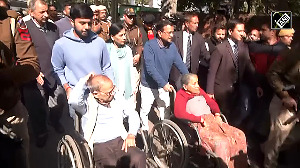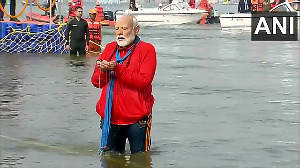GSM networks are largely absent here; only occasionally is the silence broken by a Rajnikanth jingle on a farmer's cellphone. However, a month down the line, this very farmer could well be picking up the phone to say, "Rice prices low today? Send them tomorrow? But the weather forecast says it will rain tomorrow!"
"It's a matter of time. Once people experience their lives changing with the cross-flow of information on the network, then the revolution will be all-pervasive," says P Balaji, vice-president, marketing and strategy, Ericsson India. The project, which piggybacks the existing GSM network backbone, is being undertaken across 18 villages and 15 towns.
In the testing stage, Gramjyoti has already been delivering tangible benefits to the local population. Ericsson declines to reveal its initial investments in Gramjyoti, but plans to extend the network to 100,000 villages across India in the short term, once the benefits from the pilot are accrued.
The promoters of India's first 3G network did not wait for new spectrum allocations to emerge from the discussions of the department of telecom and the Telecom Regulatory Authority of India. With the support of operators like BSNL, Bharti and Maxis, Ericsson launched what it says is India's first 3G/HSPA wireless broadband network in the first week of September. 3G works on WCDMA transmission standards.
The project, which provides services on the 2.1 Ghz band, allows high-speed internet and mobile connectivity over a 3G backbone, helping rural communities access a range of new services - telemedicine, e-education, e-governance, online local information, voice and video call services and live television and entertainment, say Ericsson officials.
The hub of the network has been set up in a school in Mamallapuram and extended to three village community centres, with Ericsson's facility in Gurgaon doing the monitoring.
However, Ericsson has no firm date to make the network official. "There is a maturity period for the network, during which it can gain users and realize long-term value for all stakeholders - people, the companies, NGOs, tech partners - involved. Gramjyoti is right now in the incubation stage," Balaji says.
The project extends the Bhoomi (Karnataka), Asha (Assam) and ITC's e-choupal concepts, by taking e-governance initiatives like land record registrations, weather and crop updates, issuance of death/birth certificates and ration cards to the grassroots level much faster.
Says Kalpana Sankar, chief executive officer of Hand in Hand, a Kancheepuram-based NGO, "The level of involvement Gramjyoti has seen from the community has been unbelievable. The three villages provided facilities to house the internet and telemedicine centres free of cost. They only need a caretaker to manage the infrastructure. At least 30 per cent of those using the internet centre for browsing are students."
Besides offering internet access at 3.6-Mbps downlinking speed, the project is also drawing in coastal communities with telemedicine services via live interactive check-ups.
The Apollo Group has been anchoring the telemedicine program, which has so far benefitted about 80 patients. Apollo supports the remote diagnosing services with mobile vans equipped with high-end medical equipment to cater to the villages at short notice.
Besides the rural poor, communities and schools will be huge beneficiaries as the network grows, with over 3,000 high school students gaining access to high-speed internet as more community centres are set up. "These students can take e-learning courses, and gain access to new information and educational resources for the first time," Ericsson officials say.
As a CSR activity, widening the social contract involves both a quest for new markets and tangible returns at the community level. Ericsson, however, stresses that revenue possibilities yielded by Gramjyoti are minimal in the short to medium term. The Apollo Group's insurance wing could, of course, see possibilities for rural insurance in the 3G-embedded villages and towns.
As for implementation, Ericsson's 100,000 village goal is achievable when TRAI freezes its 3G norms, and more cell towers are set up to extend Gramjyoti's coverage. But the first challenge facing Ericsson's network mavens and partners is to stretch the network's footprint into the rural psyche. But more of that later. Right now, the battle for 3G is being fought in the villages of Tamil Nadu.







 © 2025
© 2025